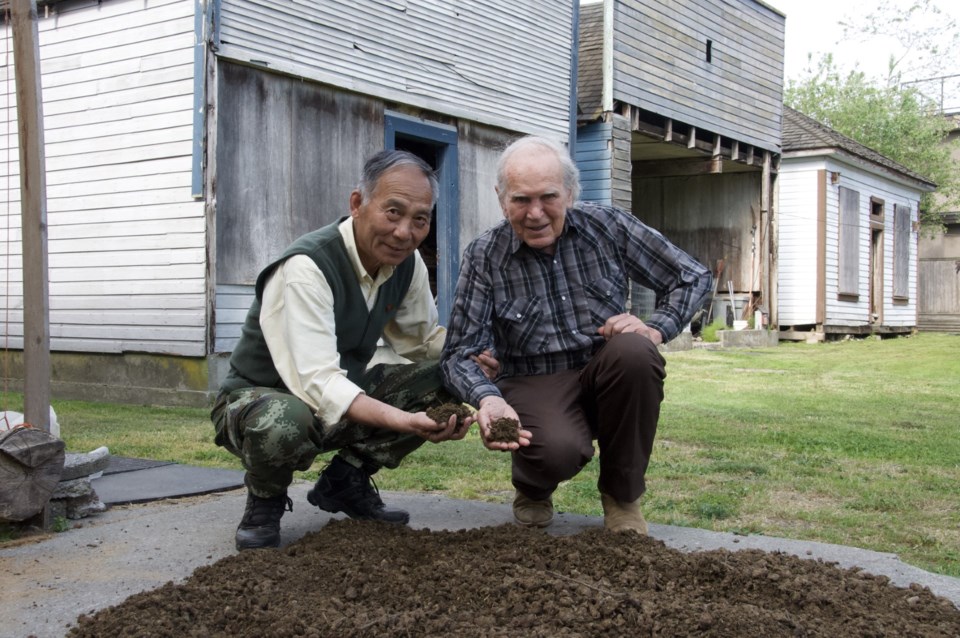Former veteran Richmond city councillor Harold Steves is busy these days working with a visiting researcher from China on his farm on Steveston Highway.
However, it’s nothing to do with raising cattle or farming eggs, the pair is testing a technology that could potentially be a game changer for the Canadian farming industry.
Farmers have been using cow manure as compost for many years due to its ability to fertilize the soil and improve crop quality.
But they need to wait for two to three years for cow poop to decompose naturally, or need an anaerobic digestion to speed up the process, which can be costly.
Steves and Xinhua Song, a 74-year-old researcher who’s visiting from China, said the technology they are testing can turn fresh cow manure into nutritious, odourless soil within two weeks to a month, depending on the weather, at a much more affordable price.
“I have never heard of [the technology] before,” said Steves.
“He uses the sprinkles that are a mixture of both bacteria and yeast or whatever the mixture is on [cow manure]. And that ferment sets very hot and kills the bad bacteria and cleans up the odour and creates good fertilizer.”
Song added that the technology can activate beneficial probiotics in the soil such as earthworms, does not cause compaction and desertification in the soil, and helps soil better absorb the nutrition and water in the air, thus improving productivity.
Over the past month, the two have used the technology to turn fresh poop from Steves’ cows into compost and have grown tomatoes and beans in it that have sprouted.
“You'll see the way we plant the tomatoes, they're very, very close together… the idea being that this [compost] is very nutritious to the plants and you can put more plants for an area,” said Steves.
“In other words, it can grow twice as many plants as you would otherwise with an artificial fertilizer.”
Song has sent the first batch of compost to SGS Canada for analysis and hopes the technology can be widely used in Canada to create healthier soil.
“I'm just offering my assistance for whatever he decides he wants to do,” said Steves.
“I’ve been looking for something to replace artificial fossil fuel fertilizers … this is something I think that could be more economical and would be much easier to adapt to small farms and gardens.”
Unexpected cross-nation collaboration
The collaboration between Steves and Song is a coincidence – they didn’t even know each other a month ago.
Song is a researcher from Shanghai who has dedicated the past 20 years to developing and promoting technology to improve the health of soil in China.
He was visiting a friend in Vancouver last month and looking for opportunities to share his experience with Canadian farmers.
“Canada is a big country in agriculture but I learned that farmers still wait for years for cow manure to decompose, while I can do it in 30 days, so I thought, let’s exchange our experience,” said Song, adding that his technology has been used in China for years.
He took a stroll on the West Dyke Trail and saw the sign for Steves’ Farm, so he asked his friend to send an email to Steves with documentation detailing his technology and its adaptation in China.
He soon received a reply.
The two met on May 1 and the next day, Song started working on Steves’ farm to demonstrate his technology. Steves brought in six cows from his family ranches so they could work on the fresh cow poop.
“When he told me what he was doing, I was very excited because before I was in politics, my background was in agricultural science and plant science and animal science,” said the long-time former Richmond councillor.
“We've had 60 years of industrial agriculture where they use chemical fertilizers and our soils are depleted. So we need to rebuild our soils and we have to have manure and compost.
“When he told me what he was doing, the light went on.”
Song has visited Steves every day since then to check on the compost and apply it to vegetables – knowing little English, he has an app in his phone to help translate their conversations.
Now on Steves’ farm, there is cow manure he saved from four years ago that’s being decomposed naturally in the traditional way, and next to it is a pile of fresher cow poop decomposed using Song’s technology.
And on the other side of the farm are the vegetables they grew using the fresh cow manure-turned compost.
For Song, what inspired him most was not the progress they’ve made, but the trust and acceptance from a Canadian man who knew nothing about him. He also didn’t know much about Steves as a former politician, neither has he ever mentioned it.
“It’s just a Canadian old man and a Chinese old man who love soil and land to grow crops here in Richmond,” Song laughed.
“We have become good friends. I really respect him and I can feel that he respects me, and the equality between people.”



